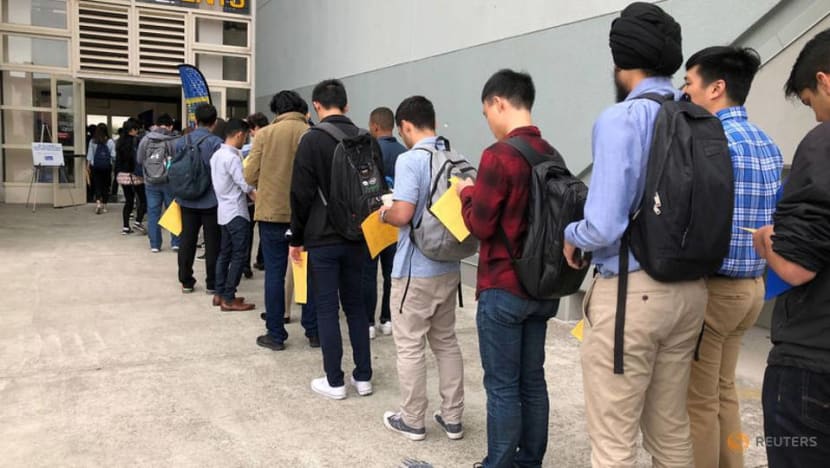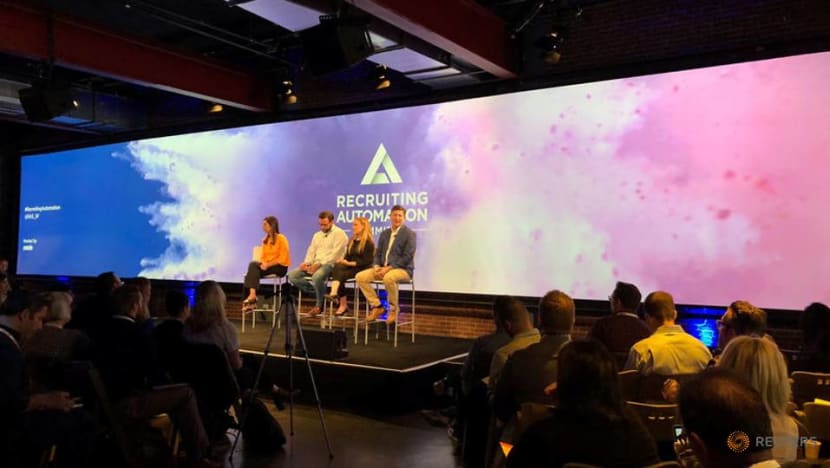commentary Commentary
Commentary: Do not fear retrenchment. Four tips for working professionals in a downturn
Being attractive to potential hirers will involve asking for help and refreshing your online profiles, among other steps you can take, says Adrian Tan.

Students wait in line to enter the University of California, Berkeley's electrical engineering and computer sciences career fair on Sep 5, 2018. (File photo: REUTERS/Ann Saphir)
SINGAPORE: With the haze last month, it seems even the skies are mirroring the dark and gloomy sentiment hanging over the global economy and the local job market outlook.
The unemployment rate for Singaporeans rose slightly in the second quarter of 2019, at 3.3 per cent for citizens, an inching up from the first quarter’s 3.2 per cent, according to the Ministry of Manpower.
While the number of retrenchments has come down, the number of vacancies has also fallen from 57,100 in March to 47,700 in June.
Meanwhile, Singapore’s GDP growth forecast has been slashed to 0.6 per cent.
READ: The Big Read: Layoffs part and parcel of any business, but not all firms let workers go with dignity
READ: Improved DFS retrenchment package 'still off the mark': SMMWU sec-gen
These numbers are worrying for working professionals. We all wonder if we ourselves might soon add to the jobless numbers, and how we can remain employable.
The last time there was significant numbers of layoffs and retrenchments was over 2008 to 2009 during the Global Financial Crisis.
Many new entrants to the job market after 2010 have the good fortune not to have experienced the accompanying pain, but now face an awkward situation of having to hedge their bets.
SPOTTING THE SIGNS
The combination of a downgraded GDP growth forecast and increased cost of business operations is a double whammy for employers and employees.
According to the Employment Salary Survey, a graduate with an NTU Mechanical degree in 2010 commanded an average wage of S$3,064. That figure jumped to S$3,653 in 2018.

It was barely a year ago that human resource (HR) consulting firms ECA International and Mercer forecast Singapore workers will receive salary hikes of 4.0 per cent and 3.8 per cent respectively in 2019.
Now that good news sound more like a liability as companies look to tighten their belts and increase their bottom lines.
Given these conditions, now is probably a good time to consider how to up your attractiveness to potential employers.
RAISING YOUR EMPLOYABILITY
Just like a rigorous training regime to prepare you for that year-end Standard Chartered marathon, raising your employability will require regular and consistent effort.
With fewer companies hiring, each has the luxury of choice and can afford to be more selective.
READ: Commentary: Here’s a sure-win bet for Singapore companies and workers as recession looms
From my years of experience working with thousands of fresh job applicants and PMETs, here are four things you need to start doing:
TIP 1: GET HELP
To many people, a job search feels like an exercise of updating your CV and sending it out to as many hiring companies as possible.
That may have worked a decade ago. But in an increasingly noisy world, competition in the job market is cut-throat.

Did you know that your CV gets read and scored by an algorithm before it lands in a recruiter’s inbox? If the keywords in your CV doesn’t match the ones in the job advertisement, you might get a low score and slip off the short list.
Technology can be your friend. Imagine if there was a tool that predicts the personality type of your interviewer and how best to counter him or her. How much easier that first conversation would be.
That reality doesn’t exist now. Meanwhile we must contend with the human beings in this space - career coaches who can be your best resource on the latest employment trends and most effective job search hacks. Many have good, insightful advice on their blogs.
LISTEN: The Pulse: A rougher ride ahead? The outlook for the Singapore economy
READ: Commentary: Many sectors are already in a recession
Government agency Workforce Singapore would be another good place to start. Their stats back them up, having placed 30,000 people back into the workforce in 2018, a rise from 25,000 the year before. They offer courses, events and job placement help.
TIP 2: IMPROVE YOUR ONLINE PROFILE
The secret to career happiness is finding a job you love. However, there is no way to tell the world you’re open to new opportunities without worrying about your employer finding out.
But imagine if you could signal to recruiters everywhere that you’d like to hear from them. By doing so, you increase your chances of having one of those magic moments when a recruiter reaches out with an amazing opportunity.
That function is readily available on LinkedIn and may be a contributor to why Singapore is one of the most connected countries globally on LinkedIn with 2.3 million users, according to analytics firm Hashmeta.

So put yourself out there. A study conducted by SHRM also found that 77 per cent of companies surveyed reported using social networking sites to recruit potential job candidates. Of which, 92 per cent hire on LinkedIn.
But you need to optimise yours to score high on search results. Few recruiters will diligently head to page 10 to identify a candidate.
That is how my wife secured her new role at a global digital firm, after an inhouse recruiter reached out to her via LinkedIn.
It took her less than three months to get the offer after optimising her profile and turning it on to show up in recruiters’ search results.
TIP 3: MAKE FRIENDS WITH HEADHUNTERS
Going by the Ministry of Manpower’s Employment Agency Directory, there are 3,867 employment agencies.
That is a lot of agency recruiters out in the market who may have some first-hand information about job openings and a good relationship with the employers and their human resources department. Their recommendation may weigh heavier compared to a cold, direct applicant.
READ: Commentary: Watch for casual ageism and other signs of caustic attitudes about older workers

It’s worth letting agency recruiters know your interest. That allows them to pitch your profile across to their clients.
And from my experience running a recruitment agency over twelve years, applicants pitched by agency recruiters tend to be viewed favourably. Employers expect that applicants from them have been highly filtered and represents the crème de la creme.
But with so many recruiters competing for the same slice of the pie, things can get competitive.
READ: Commentary: Graduates are receiving career advice they did not ask for
This is not helped by the contingency payment model – where employers assign a position to more than one agency but only pay the one that fills the placement.
It is not uncommon to hear of poor practices - from speaking to the applicant to get referees' contacts to exuding a false sense of confidence and dishing out empty promises.
So do your due diligence before engaging a recruiting firm. The specialisation of the firm and the number of years the recruiter has been in the business are good gauges.
For instance, life sciences professionals will likely seek out Real Staffing since they are only one in that space. And then do a quick check on the recruiter on LinkedIn to establish their years of experience.

At the end of the day, you must be comfortable with the recruiter. If you feel like you have learnt something after the conversation, that is a good sign.
TIP 4: ESTABLISH THOUGHT LEADERSHIP
After being in a recruitment agency for years, I wanted to get into the technology space.
I interviewed but didn’t get picked for a few roles. Frustrated but still determined, I decided to express my interest in technology (specifically in human resources) by writing.
The years of experience and writing about HR tech gave me great insights into that space. It positioned me as an expert in HR technology.
My blog now gets about tens of thousands of views each month. I have met many companies and firms who I collaborate with this way.
READ: Commentary: Career Mobility is the new Career Stability
Writer James Greig is a firm believer in why everyone should write. He says it helps you find your voice and understand more about yourself.
To me, writing also creates a presence in the career space of your choice and opportunities such as collaborations and other professional engagements would arise.

A TALE OF POOR PREPARATION
Steve* was a client at my job centre. As a manager of a large department in a global IT company, he was given a one-year heads-up that the entire department would shutter and be outsourced to the Philippines.
While he worked with senior management to wrap things up, he didn’t plan his next step. Which led him to us.
In fact it took him a while to get his job search engine running as he was relishing the break with the severance package. But all those delays came at a cost.
While his batchmate at the job centre attended interviews and considered offers, he was still struggling to put his CV together and work on his online presence.
It took six demoralising months before the first offer came in. By then, he had burnt through his severance.
Benjamin Franklin is famously quoted as saying: “By failing to prepare, you are preparing to fail.”
And preparation might help you to avoid the same painful job search journey as Steve.
* Names used are pseudonyms.
Adrian Tan is now helping companies drive their HR productivity with PeopleStrong after a decade in recruitment and outplacement, and writes regularly on HR tech.















